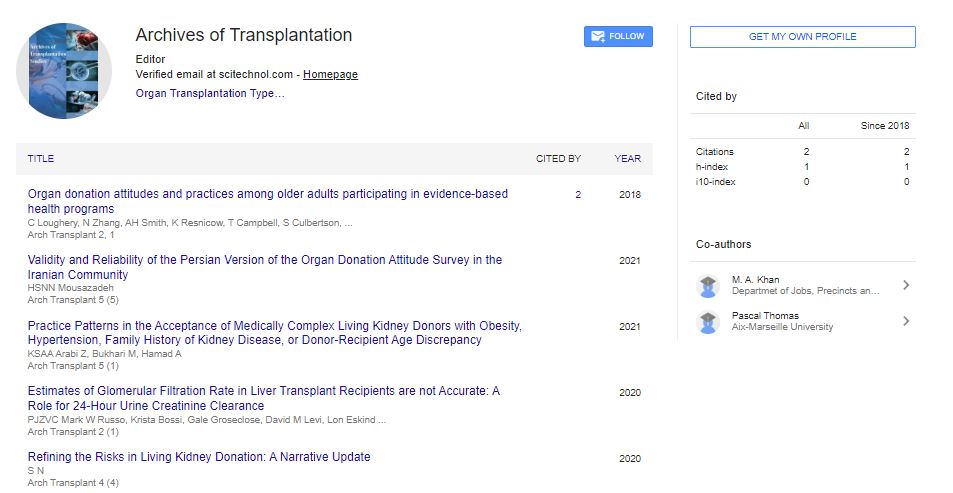Commentary, Arch Transplant Vol: 7 Issue: 2
Importance of Organ Transplantation in Medical Science
Michal Stehlik*
1Department of Medicine, Autonomous University of Barcelona, Barcelona, Spain
*Corresponding Author: Michal Stehlik,
Department of Medicine, Autonomous
University of Barcelona, Barcelona, Spain
E-mail: Michal@sth.es
Received date: 23 May, 2023, Manuscript No. AT-23-107823;
Editor assigned date: 26 May, 2023, PreQC No. AT-23-107823 (PQ);
Reviewed date: 12 June, 2023, QC No. AT-23-107823;
Revised date: 19 June, 2023, Manuscript No. AT-23-107823 (R);
Published date: 26 June, 2023 DOI: 10.4172/AT.1000143
Citation: Stehlik M (2023) Importance of Organ Transplantation in Medical Science. Arch Transplant 7:2.
Description
Organ transplantation has emerged as an important field in medical science, offering life-saving solutions to individuals suffering from end-stage organ failure. This remarkable procedure has transformed the landscape of healthcare, providing hope, extending lives, and improving the quality of life for countless patients worldwide.
Organ transplantation is a lifeline for individuals with failing organs, offering them a second chance at life. Whether it is a heart, liver, kidney, lung, or pancreas transplant, these procedures have the potential to restore vital organ function and alleviate life-threatening conditions. Organ transplantation not only saves lives but also significantly enhances the quality of life for transplant recipients. Patients who have undergone successful organ transplantation often experience improvements in their physical, emotional, and social wellbeing. With restored organ function, they can regain their independence, engage in daily activities, and participate in social and recreational pursuits.
Transplantation can also eliminate the need for frequent dialysis sessions or other invasive treatments, thereby reducing the burden on patients and improving their overall quality of life. This process has driven significant advancements in surgical techniques, pushing the boundaries of what is possible in medical science. Surgeons have refined their skills and developed innovative procedures to ensure the success of organ transplantation. Techniques such as minimally invasive laparoscopic donor nephrectomy and robotic-assisted surgeries have made living organ donation safer and more accessible. These advancements have not only improved patient outcomes but have also expanded the pool of potential organ donors.
The field of organ transplantation has made groundbreaking progress in understanding immunology and developing effective immunosuppressive therapies. Organ transplantation involves matching the donor and recipient's Human Leukocyte Antigens (HLA) to minimize the risk of rejection. Immunocompromising drugs, such as calcineurin inhibitors, antimetabolites, and corticosteroids, are used to suppress the recipient's immune system and prevent rejection of the transplanted organ.
The development of targeted immunosuppression protocols has led to improved outcomes and long-term graft survival, further underscoring the importance of organ transplantation in medical science. Organ transplantation continues to be a catalyst for research and innovation in medical science. Researchers are constantly exploring new approaches to improve transplant outcomes, such as novel immunosuppressive drugs with fewer side effects, advancements in organ preservation techniques, and the exploration of regenerative medicine and tissue engineering for organ replacement.
These ongoing efforts aim to overcome existing challenges, such as organ shortage and long-term complications, and to further optimize transplant success rates. The field of organ transplantation serves as a driving force for scientific advancements, benefiting not only transplant recipients but also the broader medical community. It has revolutionized healthcare by providing hope, extending lives, and pushing the boundaries of surgical techniques, immunology, and research.
The ongoing advancements in organ transplantation continue to pave the way for future breakthroughs and offer new possibilities for patients in need. As the field progresses, addressing challenges such as organ shortage and long-term complications remains a priority, ensuring that more individuals can benefit from this transformative treatment. The success of organ transplantation has sparked important ethical and social discussions. Debates around organ donation, allocation policies, and the definition of death have shaped legislation and influenced public perception. Organ transplantation has brought awareness to the critical importance of organ donation and has prompted various countries to adopt better systems to increase organ availability.
